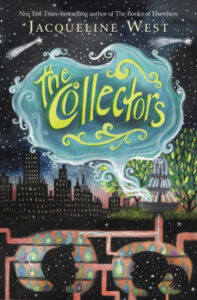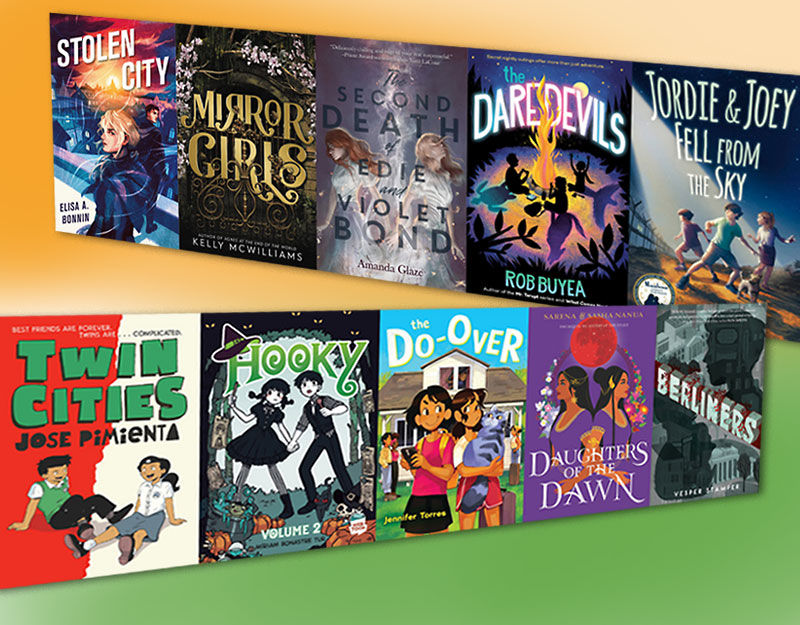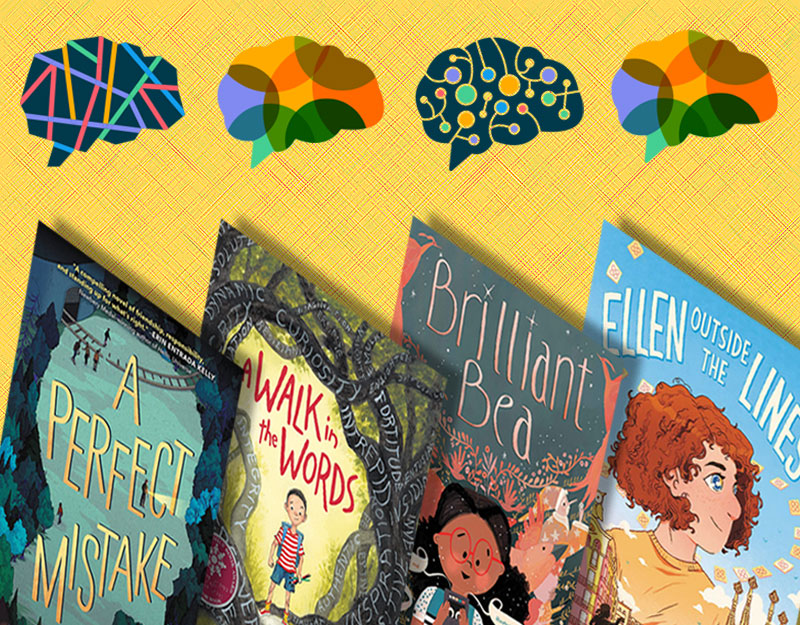Writing Outside Your Own Life (and Not Chickening Out), a guest post by Jacqueline West
 As an author, I make a lot of school visits. And at a lot of school visits, a student will hurry up to me before my talk starts, hand me a lanyard microphone—the kind that links with hearing aids— and disappear again. I’ll wear the microphone as I speak, remembering, every time I bump it with an overdramatic gesture (which happens not infrequently), that one person in the crowd is experiencing the moment just a bit differently than everyone else.
As an author, I make a lot of school visits. And at a lot of school visits, a student will hurry up to me before my talk starts, hand me a lanyard microphone—the kind that links with hearing aids— and disappear again. I’ll wear the microphone as I speak, remembering, every time I bump it with an overdramatic gesture (which happens not infrequently), that one person in the crowd is experiencing the moment just a bit differently than everyone else.
I’ve always been drawn to stories about people who see things that others don’t see, who notice things that others don’t notice. I didn’t realize it until just recently, but all the main characters in my novels—at least so far—have this in common. Olive in The Books of Elsewhere finds magic spectacles that bring paintings to life. Jaye in Dreamers Often Lie has brain trauma that brings on Shakespearean hallucinations. When I started writing The Collectors, I knew eleven-year-old Van would be one of those people too. I knew he would be an isolated kid, shuttled around the globe by his opera-singing mother, often lost in his own miniature, collectible world. I knew he would perceive things differently from the people around him. But it wasn’t until I was halfway through the book that I realized something huge: Van was hard of hearing. Suddenly, with that discovery, both the logic and the magic of the story fell into place.
ADVERTISEMENT
ADVERTISEMENT
My first instinct was to chicken straight out.
A story about deafness was not mine to tell. Deafness and hearing loss are not my personal experiences. There are no deaf or hard-of-hearing people in my immediate family. There are authors, like Cece Bell of El Deafo, who do have this background, and who have used it as material for recent, brilliant work. Of course, I write about characters whose lives are different from my own all the time—but this difference felt so foundational to my character’s experience, hoping that I could understand it well enough to use it in my own story seemed arrogant. Maybe even stupid.
My second instinct was to leave that element out of the story and just go on without it. But when I tried, I couldn’t get through a single scene. It felt like I had just met someone named Timothy and told him that I was going to call him Reginald instead. My characters wouldn’t go backward with me. They wouldn’t let me rip this vital thread out of the story. Van was hard of hearing. He just was. This was an important part of his life, and it had stemmed from the very heart of the story, and there was no way I could cut it out now without killing the whole thing.
So my third instinct was to give up on it completely. I would say goodbye to Van, a character I utterly loved, and goodbye to the magical world I had nearly finished building, and leave them on the shelf in my office that’s stuffed with other out-of-steam manuscripts. But days went by, and then weeks and months, and Van’s story refused to leave me alone. That’s when I started to hope that a fantasy about wishes and underground worlds and distractible talking squirrels—all experienced through the perspective of a boy with hearing aids—might be a story I was meant to tell. So I got help.
I read like crazy (I highly recommend What’s that Pig Outdoors? by Henry Kisor and Gerald Shea’s Song Without Words). I reached out to local DHH teachers, who let me visit with their students, interviewing them, shadowing them during their school day, peppering them with questions. (One of those teachers even read the whole manuscript for inaccuracies. Thanks again, Angela!) I met with a book club from a school for the Deaf, and with parents of deaf and hard-of-hearing kids. The generosity and insight of all these people were incredible. The things they shared with me combined with the Van who already existed in my imagination, giving him his own unique view of the world—a view that leads him into danger, wonder, and unexpected magic.
I was reminded of something important as I wrote this book: we all want to find ourselves in a story. When you ask people to share a tiny bit of themselves, so that you can weave it into a story that will resonate with others, they don’t usually say no. They say sure! And then they tell stories of their own. It’s such a gift—and it’s one that I hope I can pass along to every reader who opens a copy of The Collectors. That, and some dangerous wishes, and an underground collection, and a distractible talking squirrel. Hope you enjoy.
Meet Jacqueline West
 Jacqueline West is the author of the middle grade fantasy The Collectors, the YA novel Dreamers Often Lie, and the NYT-bestselling series The Books of Elsewhere. Her debut, The Shadows (The Books of Elsewhere, Volume One), garnered multiple starred reviews and state award nominations, was named a Publishers Weekly Flying Start, and received the 2010 CYBILS award for fantasy/science fiction. Jacqueline lives amid the bluffs of Red Wing, Minnesota, surrounded by large piles of books and small piles of dog hair. Find Jacqueline online: www.jacquelinewest.com, Instagram: jacqueline.west.writes, and Facebook.
Jacqueline West is the author of the middle grade fantasy The Collectors, the YA novel Dreamers Often Lie, and the NYT-bestselling series The Books of Elsewhere. Her debut, The Shadows (The Books of Elsewhere, Volume One), garnered multiple starred reviews and state award nominations, was named a Publishers Weekly Flying Start, and received the 2010 CYBILS award for fantasy/science fiction. Jacqueline lives amid the bluffs of Red Wing, Minnesota, surrounded by large piles of books and small piles of dog hair. Find Jacqueline online: www.jacquelinewest.com, Instagram: jacqueline.west.writes, and Facebook.
About THE COLLECTORS
Even the smallest wish can be dangerous. That’s why the Collectors are always keeping watch.
ADVERTISEMENT
ADVERTISEMENT
The Collectors sweeps readers into a hidden world where wishes are stolen and dreams have a price. Fast-paced, witty, and riveting, this contemporary fantasy adventure has magic woven through every page.
It’s the first book in a two-book series from Jacqueline West, the New York Times–bestselling author of The Books of Elsewhere series. For fans of Serafina and the Black Cloak, The Isle of the Lost, and The Secret Keepers.
Van has always been an outsider. Most people don’t notice him. But he notices them. And he notices the small trinkets they drop, or lose, or throw away—that’s why his collection is full of treasures. Then one day, Van notices a girl stealing pennies from a fountain, and everything changes. He follows the girl, Pebble, and uncovers an underground world full of wishes and the people who collect them. Apparently not all wishes are good and even good wishes often have unintended consequences—and the Collectors have made it their duty to protect us. But they aren’t the only ones who have their eyes on the world’s wishes—and they may not be the good guys, after all.
Jacqueline West, author of the New York Times–bestselling Books of Elsewhere series, draws readers into a story about friendship, magic, and the gray area between good and evil. The Collectors is for fans of Cassie Beasley’s Circus Mirandus and Jonathan Auxier’s The Night Gardener.
Filed under: Guest Post
About Amanda MacGregor
Amanda MacGregor works in an elementary library, loves dogs, and can be found on Twitter @CiteSomething.
ADVERTISEMENT
ADVERTISEMENT
SLJ Blog Network
2024 Books from Coretta Scott King Winners
The Ultimate Love Letter to the King of Fruits: We’re Talking Mango Memories with Sita Singh
Double Booking | This Week’s Comics
Parsing Religion in Public Schools
ADVERTISEMENT







